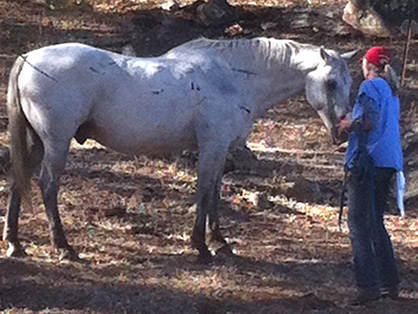UC Davis Veterinarians Work Around the Clock to Care For CA Fire Victims
UC Davis School of Veterinary Medicine
September 21, 2015 –As the Valley and Butte Fires begin to come under control, with both now being more than 70% contained, veterinarians from UC Davis worked day and night for the past week caring for animals from the fires. A team of veterinarians from several entities of the School of Veterinary Medicine—the Veterinary Emergency Response Team, Center for Equine Health (CEH), the veterinary hospital’s Large Animal Clinic (LAC) and the International Animal Welfare Training Institute—performed search and rescue missions and cared for animals in the fire zones, while another team tirelessly treated animals back at the hospital.
In the field, CEH Director Dr. Claudia Sonder went door-to-door, ranch-to-ranch, looking for animals that had to be left behind as the fires approached so rapidly the residents barely had time to get out with their lives. Some weren’t able to get out at all.
“I encountered one owner who was trapped on her ranch by the fast moving blaze,” said Dr. Sonder. “She and her dogs survived by riding out the fire in her water trough.”
She covered her head with a wet pair of blue jeans, recalled Dr. Sonder, while water funneled out of the trough by the fire’s updraft. She watched as her horses gathered in a small pond nearby, with all but their noses submerged in the water. Miraculously, they all survived.
At another property, Dr. Sonder encountered a fireman who was had walked an entire large property looking for the owner’s horses, but to no avail on the first day. He came back the next day, repeating his search, and found the horses. He was able to round them up into a corral that survived the fire, and filled the water trough from his truck. He fed them with hay that hadn’t burned. Dr. Sonder examined the horses and told the fireman that he had saved their lives. He humbly stated to Dr. Sonder that his wife had horses and he knew how sad she would be to lose hers, so he felt he had to do everything he could to find this woman’s horses.
“Like so many firemen we met, he exemplified all that is good in humans,” said Dr. Sonder, who worked every day in the field, from sunrise to well beyond sunset.
Tales of people’s help continued. At sunset every night, Dr. Sonder would return to “home base” in the Valley Fire, the Middletown Animal Hospital which thankfully survived. While treating animals at MAH one night, she heard a knock on the door. It was a Good Samaritan who had driven all the way from Las Vegas with 4 tons of hay to donate. Everyone at the hospital, including local citizens who had just dropped off an injured stray cat, jumped into action to unload the truck at 10 p.m.
At the Butte Fire, several LAC residents and students helped assist the staff at the Angels Camp Veterinary Hospital, where many of the animals brought to UC Davis originated. Rescue group volunteers transported animals from Angels Camp to UC Davis all week.
Meanwhile, back at the UC Davis veterinary hospital, a team of veterinarians, animal health technicians and students—led by Dr. Steve Epstein, a specialist in the Small Animal Clinic‘s Emergency and Critical Care Service—admitted animals from the fires almost every day this past week. Working days, nights and through the weekend, Dr. Epstein and his team cared for more than 30 animals brought to the hospital’s emergency room. The “all hands on deck” situation called for coordination from every level of the hospital, with faculty, staff and students all coming together to make the influx of emergency patients as smooth as possible. All of this was handled during a time when the specialty hospital was already at nearly 90 percent capacity with normal patients unrelated to the fires.
At 9 p.m. on Saturday night—normally a quiet time at the hospital—the halls were bustling with foot traffic. Students filled a care ward, tending to the burned cats, some of which are just small kittens who long for affection from anyone who comes near the cages. Technicians and emergency room veterinarians, weary from a long week, continued on, knowing the next day was bringing more of the same.
Working in conjunction with other veterinarians and rescue groups at the fires, UC Davis has received 38 animals to date: 30 cats, two horses, two pigs, two chickens, one dog and one goat. Most of the animals are unclaimed. Through microchips and photographs on the school’s Facebook page, hospital administrators have been able to reunite four cats and the goat with their owners. All of those owners have lost everything in the fires, but reunions with the animals were lighting up their otherwise damaged worlds.
Early in the week, UC Davis established a fund to help pay for the fire victim’s treatments. It is estimated that it will cost $6000/week to care for the 30 cats currently at the hospital. Those cats are expected to be hospitalized for up to three weeks. The public can make online donations to the fund at http://bit.ly/1JcsoBZ.
Photos and more information on the displaced animals at UC Davis can be found at www.facebook.com/ucdavisvetmed.
About the Veterinary Medical Teaching Hospital
The William R. Pritchard Veterinary Medical Teaching Hospital at the University of California, Davis—a unit of the #1 world ranked School of Veterinary Medicine—provides state-of-the-art clinical care while serving as the primary clinical teaching experience for DVM students and post graduate veterinarian residents. The VMTH treats more than 51,000 animals a year, ranging from cats and dogs to horses, cows and exotic species. To learn more about the VMTH, please go to www.vetmed.ucdavis.edu/vmth. Timely news updates can be received on its Facebook (www.facebook.com/ucdavisvetmed) and Twitter (www.twitter.com/ucdavisvetmed) pages.












